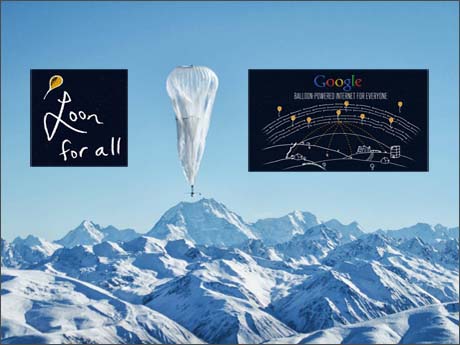
November 15 2015: Google's Project Loon to provide access to vast swathes of the land by floating balloons at around 30 kms above the earth, may soon come to India.
The Indian government is known to have approved testing the system here and is setting up a committee of the Department of Electronics and Information Technology to coordinate with Google.
Project Loon ( which is a recall of bal-loon and also of the seemingly loony nature of the idea) was tried out for the first time in New Zealand and then in Brazil. Vatican City will became the first state to get full LTE coverage via a Google Loon , and Sri Lanka is the second nation to sign up for country wide coverage.
______________________________________________________________________________
Tech Note From Wikipedia:
Project Loon is a research and development project being developed by Google X with the mission
of providing Internet access to rural and remote areas. The project uses high-altitude balloons placed
in the stratosphere at an altitude of about 32 km (20 mi) to create an aerial wireless network with up
to 3G-like speeds. It was named Project Loon, since Google itself found the very idea of providing
internet access to the remaining 5 billion population unprecedented and "crazy."
The balloons are maneuvered by adjusting their altitude to float to a wind layer after identifying the
wind layer with the desired speed and direction using wind data from the National Oceanic and
Atmospheric Administration (NOAA). Users of the service connect to the balloon network using a
special Internet antenna attached to their building. The signal travels through the balloon network
from balloon to balloon, then to a ground-based station connected to an Internet service provider
(ISP), then onto the global Internet. The system aims to bring Internet access to remote and rural
areas poorly served by existing provisions, and to improve communication during natural disasters
to affected regions. Explanatory video:
_________________________________________________________________________________